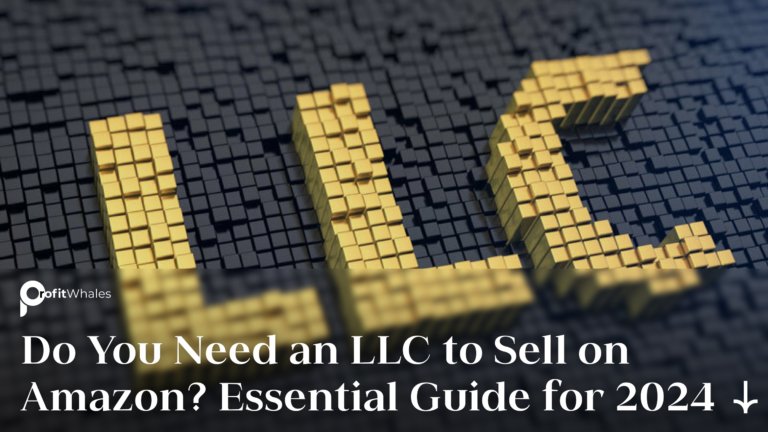
Selling on Amazon has become a lucrative opportunity for many entrepreneurs. With the platform’s vast reach and diverse customer base, individuals and businesses can achieve significant sales and growth. However, one common question arises: do you need an LLC to sell on Amazon? Understanding whether an LLC (Limited Liability Company) is necessary can help you make informed decisions about how to structure your Amazon business.
Understanding Business Structures
Before diving into whether you need an LLC to sell on Amazon, it’s essential to understand the various business structures available. These structures include Sole Proprietorships, Partnerships, LLCs, and Corporations. Each has its advantages and disadvantages, and the right choice depends on your business goals, liability concerns, and tax preferences.
- Sole Proprietorship: This is the simplest form of business, where the owner and the business are legally the same entity. It’s easy to set up but offers no personal liability protection.
- Partnership: Similar to a sole proprietorship but involves two or more individuals. Partners share profits, losses, and liabilities.
- LLC (Limited Liability Company): Combines the liability protection of a corporation with the tax benefits and flexibility of a partnership or sole proprietorship.
- Corporation: A more complex structure that provides extensive liability protection and various tax advantages but requires more regulatory compliance and formalities.
Understanding these structures is crucial for deciding whether do you need an LLC to sell on Amazon or if another structure might be more suitable.
What Is an LLC?
Definition of an LLC (Limited Liability Company)
An LLC, or Limited Liability Company, is a business structure in the United States that offers its owners limited liability. This means that the owners, known as members, are generally not personally liable for the company’s debts and liabilities. This separation provides a layer of protection for personal assets, which is a significant consideration when determining do I need LLC to sell on Amazon.
Key Features of an LLC
The key features of an LLC include:
- Limited Liability Protection: Members are protected from personal liability for business debts and claims.
- Pass-Through Taxation: Profits and losses pass through to the members’ personal tax returns, avoiding the double taxation seen in corporations.
- Flexible Management Structure: LLCs can be managed by the members or by appointed managers.
- Fewer Formalities: Compared to corporations, LLCs require fewer annual meetings and record-keeping.
These features make an LLC a popular choice for small business owners, including those considering selling on Amazon.
Advantages of Forming an LLC for Your Amazon Business
Forming an LLC for your Amazon business has several advantages, answering the question, should I create an LLC to sell on Amazon:
- Liability Protection: Personal assets are protected from business debts and legal actions.
- Tax Flexibility: You can choose how you want to be taxed, whether as a sole proprietor, partnership, S corporation, or C corporation.
- Credibility: Having an LLC can enhance your business’s credibility with customers and suppliers.
- Operational Flexibility: LLCs offer flexibility in management and operations, allowing you to tailor the structure to your needs.
Considering these benefits can help determine if an LLC for Amazon is the right choice for you, and address concerns like can you sell on Amazon without an LLC and the potential advantages of forming one.
In the next sections, we will delve deeper into Amazon’s requirements for sellers, compare selling with and without an LLC, and explore the benefits and common misconceptions associated with having an LLC for your Amazon business.
Do You Need an LLC to Sell on Amazon?
Amazon’s Requirements for Sellers
Amazon does not explicitly require sellers to have an LLC to sell on its platform. Anyone can start selling with just a personal account or as a sole proprietor. However, while Amazon itself does not mandate an LLC, having one can offer several benefits and protections for sellers. This raises the common question: do you need an LLC to sell on Amazon?
Comparison of Selling With and Without an LLC
Without an LLC
- Sole Proprietorship: Operating as a sole proprietor is straightforward and involves minimal setup. However, it offers no personal liability protection, meaning your personal assets could be at risk if your business incurs debts or legal issues.
- Personal Responsibility: All business liabilities and debts are directly tied to you personally, which can be risky.
With an LLC
- Limited Liability: An LLC protects your personal assets from business liabilities and debts. This is a significant advantage for anyone asking, do I need an LLC to sell on Amazon.
- Professional Image: An LLC can enhance your business’s credibility, making it more attractive to customers and suppliers.
Benefits of Having an LLC as an Amazon Seller
Having an LLC as an Amazon seller can provide numerous advantages, helping you make an informed decision about whether do you need LLC to sell on Amazon:
- Liability Protection: One of the main benefits of an LLC is the protection it offers to your personal assets. This is especially important for Amazon sellers who might be dealing with various liabilities.
- Tax Flexibility: LLCs offer flexibility in how you are taxed, which can be beneficial depending on your financial situation.
- Credibility: Operating as an LLC can lend more credibility and professionalism to your business, which can help build trust with customers.
Common Misconceptions About LLCs and Amazon Selling
- Mandatory Requirement: A common misconception is that you must have an LLC to sell on Amazon. While beneficial, it is not mandatory, which answers the question do you have to have an LLC to sell on Amazon.
- Complex Setup: Some believe setting up an LLC is overly complicated. In reality, the process is straightforward and can provide significant benefits.
- Costly: Another misconception is that forming an LLC is prohibitively expensive. However, the costs are often outweighed by the benefits of liability protection and tax advantages.
Benefits of Having an LLC for Your Amazon Business

Limited Liability Protection
One of the primary reasons many sellers choose to form an LLC is for the limited liability protection it offers. This means that your personal assets are generally protected from any debts or legal actions against your business. This protection is a key reason why many ask, do you need a LLC to sell on Amazon or do I need LLC to sell on Amazon.
Professional Credibility and Trust
Forming an LLC can enhance your business’s credibility. Customers and suppliers are more likely to trust a business that is officially registered as an LLC. This can be particularly beneficial when negotiating with suppliers or dealing with high-value customers. Therefore, many wonder, should I create an LLC to sell on Amazon?
Tax Benefits and Flexibility
An LLC offers several tax benefits and flexibility that are not available to sole proprietors. You can choose how you want your LLC to be taxed, whether as a sole proprietor, partnership, S corporation, or C corporation. This flexibility can lead to significant tax savings, making an LLC for Amazon a smart choice for many sellers.
Ease of Management and Ownership
LLCs are relatively easy to manage and offer flexibility in ownership. You can have single or multiple members, and the operational requirements are less stringent than those for corporations. This ease of management is another reason sellers consider forming an LLC for Amazon seller.
In conclusion, while Amazon does not require you to have an LLC to sell on its platform, the benefits of forming an LLC make it a worthwhile consideration. Whether you are contemplating do you need an LLC to dropship on Amazon, can I sell on Amazon without LLC, or any other variations, understanding the advantages and process of forming an LLC can help you make the best decision for your business.]
Steps to Form an LLC
Choosing a Business Name
Choosing a business name is the first step in forming an LLC. Your business name should be unique, relevant to your products or services, and comply with your state’s LLC naming requirements. It’s crucial to ensure that the name you choose is not already in use by another business in your state.
- Research Availability: Check your state’s business name database to ensure your desired name is available.
- Domain Name: Consider securing a matching domain name for your website to maintain brand consistency.
- Naming Rules: Ensure the name complies with your state’s rules, which typically require the inclusion of “LLC” or “Limited Liability Company” in the name.
This step is essential for those wondering, do u need an LLC to sell on Amazon, as having a unique business name is a foundational part of establishing your LLC.
Filing Articles of Organization
The next step is to file the Articles of Organization with your state’s LLC filing office, typically the Secretary of State. This document officially creates your LLC.
- Information Required: You will need to provide details such as your LLC’s name, address, the names of the members, and the registered agent’s information.
- Filing Fee: There is a filing fee that varies by state, typically ranging from $50 to $500.
- Processing Time: Processing times can vary, so it’s wise to check with your state’s filing office.
Filing the Articles of Organization is a crucial step, addressing the question, do I need to create an LLC to sell on Amazon. It formalizes your business structure, providing you with legal recognition and benefits.
Creating an Operating Agreement
An Operating Agreement outlines the management structure and operating procedures of your LLC. While not required in every state, it is highly recommended.
- Management Structure: Specify whether the LLC will be managed by its members or by appointed managers.
- Ownership and Voting Rights: Define the ownership percentages and voting rights of each member.
- Profit Distribution: Outline how profits and losses will be distributed among members.
- Operating Procedures: Include procedures for adding new members, handling disputes, and dissolving the LLC if necessary.
Creating an Operating Agreement helps clarify the internal workings of your LLC, which is beneficial for maintaining smooth operations and is part of understanding what is Amazon LLC.
Obtaining an EIN (Employer Identification Number)
An EIN, or Employer Identification Number, is a federal tax ID number issued by the IRS. It is required for tax purposes and is necessary for opening a business bank account and hiring employees.
- Application Process: You can apply for an EIN online through the IRS website. The application is free and straightforward.
- Business Identity: The EIN serves as your business’s identity for tax purposes, similar to how a Social Security number works for individuals.
Obtaining an EIN is an essential step, particularly for those asking, should I create an LLC to sell on Amazon. It is a necessary component for managing your business finances and complying with tax regulations.
Registering for State Taxes and Permits
Depending on your state and the nature of your business, you may need to register for state taxes and obtain various permits and licenses.
- State Tax Registration: Register with your state’s tax agency to obtain a sales tax permit, employer taxes, and other applicable state taxes.
- Business Licenses and Permits: Depending on your business activities, you may need specific licenses and permits. Check with your local and state government to ensure you are compliant.
- Ongoing Compliance: Keep track of renewal dates and ensure you stay compliant with all regulatory requirements.
This step ensures that you meet all legal requirements, which is crucial for maintaining the benefits of your LLC and addressing concerns like, can you sell on Amazon without an LLC and do you need an LLC to sell on Amazon.
In conclusion, forming an LLC involves several steps, each crucial for establishing a solid legal foundation for your business. Whether you are an LLC Amazon seller or contemplating Amazon seller LLC type, following these steps ensures you reap the full benefits of LLC for Amazon. This process also clarifies any lingering questions such as do you need an LLC to sell on Amazon and amazon seller LLC formalities.
Alternatives to Forming an LLC

Operating as a Sole Proprietor
Operating as a sole proprietor is the simplest and most common way to start a business. In this structure, there is no legal distinction between the owner and the business. This means the owner is personally responsible for all debts and liabilities incurred by the business.
- Pros: Easy to set up, minimal regulatory burden, full control over business decisions.
- Cons: Personal liability for business debts, difficulty raising capital, limited credibility with suppliers and customers.
For those asking, do you need an LLC to sell on Amazon, the answer is no, you can start as a sole proprietor. However, understanding what is Amazon Services LLC can help you decide if a more formal structure is beneficial as your business grows.
Forming a Partnership
A partnership involves two or more people sharing ownership of a business. Partnerships can be general (where all partners manage the business and share liability) or limited (where some partners invest capital but do not participate in management and have limited liability).
- Pros: Easy to establish, shared financial commitment, complementary skills from partners.
- Cons: Joint liability for business debts, potential for conflicts, shared profits.
If you are starting a business with someone else, you might wonder, do you need LLC to sell on Amazon as partners. While a partnership can work, forming an LLC can provide better liability protection and structure.
Pros and Cons of Each Alternative
Choosing the right business structure depends on your specific needs and goals. Here’s a summary of the pros and cons for each alternative:
- Sole Proprietorship:
- Pros: Simple setup, complete control.
- Cons: Personal liability, harder to raise funds.
- Partnership:
- Pros: Shared responsibility, pooled resources.
- Cons: Joint liability, potential for disputes.
- Corporation:
- Pros: Limited liability, easier capital acquisition.
- Cons: Regulatory complexity, potential for double taxation.
In deciding, do you need an LLC to sell on Amazon or should you consider other structures like a corporation or partnership, weigh the benefits and drawbacks carefully. Forming an Amazon corporate LLC or an Amazon LLC can offer substantial benefits, especially in terms of liability protection and credibility.
Conclusion
In conclusion, deciding whether to form an LLC for your Amazon business depends on various factors, including your personal liability comfort, tax preferences, and long-term business goals. While do you need an LLC to sell on Amazon? No, it’s not a mandatory requirement. However, the benefits of having an LLC, such as limited liability protection, tax flexibility, and enhanced credibility, make it a worthwhile consideration for many sellers. By understanding the steps to form an LLC and exploring alternatives, you can make an informed decision that best suits your business needs. Whether you’re starting as a sole proprietor, considering a partnership, or contemplating an Amazon corporate LLC, the key is to choose a structure that aligns with your business strategy and provides the necessary protections and advantages.
FAQ
Can I sell on Amazon without an LLC?
Yes, you can sell on Amazon without an LLC. Many sellers start as sole proprietors or even use personal accounts to begin selling. However, forming an LLC can provide benefits such as liability protection and tax advantages that might be beneficial as your business grows. So, while do you need an LLC to sell on Amazon? No, but it’s often recommended for the added protections.
What are the benefits of having an LLC for my Amazon business?
The benefits of having an LLC for your Amazon business include:
- Limited Liability Protection: Protects your personal assets from business debts and liabilities. This is one of the main benefits of LLC for Amazon sellers.
- Tax Flexibility: Offers various tax options, including pass-through taxation, which can be advantageous.
- Professional Credibility: Enhances your business’s credibility with customers and suppliers.
- Operational Flexibility: Allows for a more flexible management structure compared to corporations.
How much does it cost to form an LLC?
The cost to form an LLC varies by state but typically ranges from $50 to $500. This includes filing fees for the Articles of Organization. There may also be additional costs for things like operating agreements, EINs, and state-specific business licenses or permits. If you’re wondering should I create an LLC to sell on Amazon, consider these costs against the benefits of liability protection and tax flexibility.
Do I need a separate bank account for my LLC?
Yes, it is highly recommended to have a separate bank account for your LLC. This helps to keep your business finances separate from your personal finances, simplifies accounting and tax reporting, and is essential for maintaining the liability protection that an LLC offers. This step is crucial whether you’re an LLC Amazon seller or considering what is Amazon LLC.
Can I convert my sole proprietorship to an LLC later?
Yes, you can convert your sole proprietorship to an LLC later. This involves filing the necessary paperwork with your state, such as the Articles of Organization, and updating any licenses and permits. You will also need to notify the IRS and obtain a new EIN for your LLC. If you’re wondering how to change Amazon seller account to LLC, this process is straightforward and beneficial for expanding your business.
How does having an LLC affect my taxes?
An LLC offers several tax benefits and flexibility. By default, a single-member LLC is taxed as a sole proprietorship, and a multi-member LLC is taxed as a partnership. However, you can also elect to have your LLC taxed as an S corporation or C corporation, depending on your business needs. This flexibility allows you to choose the tax structure that best suits your financial situation and can potentially provide tax savings. Understanding what is Amazon Services LLC and its tax implications can also guide your decision.





